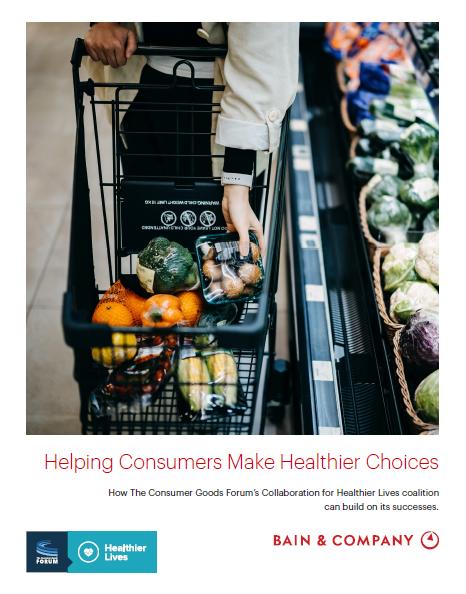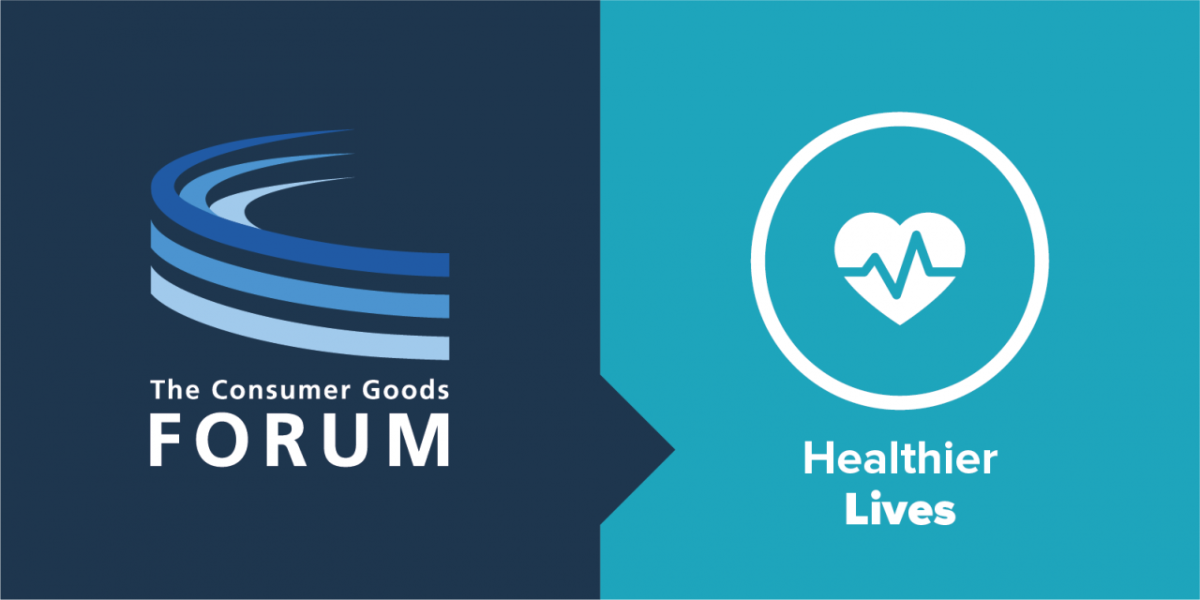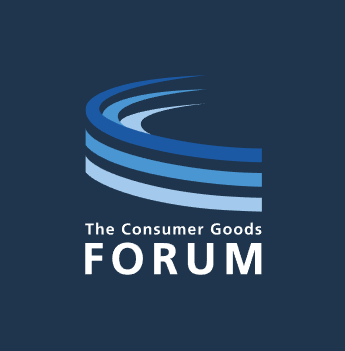Recipe for Success: How Retailers and Consumer Goods Companies Can Further Encourage Healthier Living
Joint report by Bain & Company and The Consumer Goods Forum evaluates more than 70 programmes from Collaboration for Healthier Lives Coalition
PARIS, June 17, 2021 /3BL Media/ - After more than a year of living through a pandemic, health is at the forefront of consumers’ minds. A recent survey by Bain & Company found that in the U.S., China, and four European countries, an average of 53% of consumers say they now care more about their health, and 42% of European consumers now report spending more on healthier or non- processed foods compared to before the Covid-19 pandemic.
Consumer goods manufacturers and retailers play a crucial role in creating, producing and distributing the products that people buy. As such, they can also influence the choices of their end customers.
Bain & Company partnered with The Consumer Goods Forum (CGF) to assess collaboration programmes launched by their Collaboration for Healthier Lives (CHL) Coalition. The CHL initiative brings together a network of manufacturers, retailers, public health authorities and local communities that collaborate to make it easier for people around the world to adopt healthier lives for themselves and their families, by making healthier decisions easier and habitual.
Over the past three years, CHL has launched more than 70 local programmes across a dozen countries. The programmes took place in both physical and digital channels and deployed multiple approaches. More than half of them solely focused on building consumer awareness for health-related topics, for instance through advisory-based communication through apps, websites, or in-store demonstrations with personal trainers or nutritionists. Other programmes sought to alter actual purchasing behaviour through tangible changes in the shopping environment, using mechanisms such as pricing/promotions on healthier products or modifications to product range and availability.
The full report can be found here.
“Health has never been more important for people across the world, and the urgency for industry action to address global health challenges has been heightened by the pandemic,” said Sharon Bligh, Healthier Lives Director at The Consumer Goods Forum. “For several years, our members have driven local CHL initiatives to help consumers make healthier lifestyle choices, and I want to thank all those involved in supporting CHL over the last few years. We welcome Bain & Company’s insights to help us reflect on what we have learned on the journey, and will take these lessons and knowledge to find the path forward and drive even more positive outcomes.”
The research found four key success factors that manufacturers, retailers, and other coalition participants should consider when designing collaborative programmes to drive healthier lives:
- Build programmes that are ideally personalised, or at least targeted and segmented based on deep, actionable consumer insights. Programmes should be rooted in behavioural science and real consumer insights to better target the specific contributors to healthier behaviour and overcome the most relevant barriers for target segments.
- Anchor the programme in locally relevant health objectives, and leverage resources from elsewhere when practical. Programmes should adopt work conducted or vetted by other relevant stakeholders to benefit from previous experience and move into action quickly, especially when it relates to local contexts or specific goals. This could mean aligning with health goals set by local authorities or implementing programmes with demonstrated results elsewhere.
- Alter the consumer and shopper environment so that healthier choices become the default for consumers while remaining commercially viable for participating companies. Consumers may still make unhealthy choices despite increased awareness and education. Ultimately, the shopping environment and “nudging” cues exert a much stronger impact on what people do than what people consciously think. Therefore, manufacturers and retailers should strive to implement more environmental changes, for instance in product pricing, availability or placement, or to look further upstream at modifications to actual products, such as reformulation or portion size reduction, particularly in the food space.
- Ensure that impact can be measured against a clear definition of success that is agreed upon before the programme starts, including actual consumer reach and impact and commercial viability for participating companies, with the goal of easily identifying those programmes that are most successful and allow for seamless roll-out.
“The coalition has made great progress over the past few years to encourage healthier living, launching a variety of programmes that reached consumers around the world,” said Joëlle de Montgolfier, executive vice president of the global retail and consumer products practices at Bain & Company. “This report showcases the approaches that are proven to yield the best results. We hope that it will help consumer goods manufacturers and retailers to accelerate in their efforts to meet growing demand for healthier offerings.”
For further information, please contact:
Bain & Company
Aliza Medina at aliza.medina@bain.com or +44 20 7969 6480
The Consumer Goods Forum
Lee Green at l,green@theconsumergoodsforum.com
About Bain & Company
Bain & Company is a global consultancy that helps the world’s most ambitious change makers define the future.
Across 61 offices in 38 countries, we work alongside our clients as one team with a shared ambition to achieve extraordinary results, outperform the competition, and redefine industries. We complement our tailored, integrated expertise with a vibrant ecosystem of digital innovators to deliver better, faster, and more enduring outcomes. Our 10-year commitment to invest more than $1 billion in pro bono services brings our talent, expertise, and insight to organizations tackling today’s urgent challenges in education, racial equity, social justice, economic development, and the environment. We earned a gold rating from EcoVadis, the leading platform for environmental, social, and ethical performance ratings for global supply chains, putting us in the top 2% among other consulting firms. Since our founding in 1973, we have measured our success by the success of our clients, and we proudly maintain the highest level of client advocacy in the industry.
About The Consumer Goods Forum
The Consumer Goods Forum (“CGF”) is a global, parity-based industry network that is driven by its members to encourage the global adoption of practices and standards that serves the consumer goods industry worldwide. It brings together the CEOs and senior management of some 400 retailers, manufacturers, service providers, and other stakeholders across 70 countries, and it reflects the diversity of the industry in geography, size, product category and format. Its member companies have combined sales of EUR 3.5 trillion and directly employ nearly 10 million people, with a further 90 million related jobs estimated along the value chain. It is governed by its Board of Directors, which comprises 57 manufacturer and retailer CEOs. For more information, please visit: www.theconsumergoodsforum.com.
About Collaboration for Healthier Lives Coalition
The Consumer Goods Forum (CGF)’s CEO-led Coalition of Action on Collaboration for Healthier Lives (CHL) is about making it easier for people around the world to adopt healthier lives for themselves and their families. It’s about making healthier decisions easier and habitual for people in every community around the world. CHL is a global movement led by manufacturers, retailers, public health authorities and local communities, delivering local movements in communities worldwide. There are currently nine CHL initiatives running across 14 countries and involving over 100 organisations. As a collective, members of the CGF, and their partners, are exploring, experimenting, innovating and evolving business models to support positive change, while sharing data and knowledge at scale, cross industry. Health is not a competitive advantage; it’s a basic necessity. And, it’s clear no company can solve this issue alone. Collaboration is needed at scale and across sectors if the consumer goods industry is to play the necessary role in the health and wellbeing of people. To learn more, visit www.tcgfhealthierlives.com.



